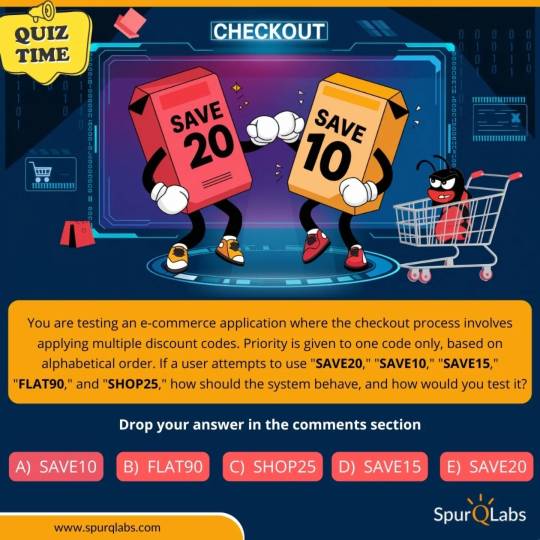#TestingCommunity
Explore tagged Tumblr posts
Text
Variety of Roles and Specializations Software Testing coding bit
Variety of Roles and Specializations Software Testing coding bit Once you've mastered the fundamentals of software testing, a wide range of specialized career paths becomes available. You can choose to work as a Manual Tester, focusing on real-world interactions and exploratory testing without automation. If you prefer working with code and tools, the role of an Automation Tester involves scripting and running automated tests to improve efficiency. As a Performance Tester, you'll evaluate an application's speed, scalability, and reliability under various conditions. In the role of a Security Tester, your priority will be identifying and mitigating vulnerabilities to protect the software from threats. Finally, a Quality Assurance (QA) Engineer oversees the entire testing lifecycle, ensuring the final product meets quality standards and business requirements.
As software systems grow more complex, software testing has evolved into a broad field with multiple roles and specializations.
Software testing offers diverse career paths based on your skills and interests:
Manual Tester: Tests software manually through user interactions.
Automation Tester: Writes scripts to automate repetitive testing tasks.
Performance Tester: Evaluates software speed and scalability under load.
Security Tester: Finds and fixes security vulnerabilities in applications.
QA Engineer: Manages the entire testing process to ensure product quality.

#SoftwareTesting#TestingLife#QAEngineer#QualityAssurance#BugHunting#TestAutomation#ManualTesting#SoftwareQuality#TestingCommunity#QA
0 notes
Text
Software testing is an essential aspect of software development that ensures the quality, reliability, and performance of applications. "The Art of Software Testing" by Glenford J. Myers is a classic book that provides a deep understanding of the principles, techniques, and best practices of software testing. Below is a user-friendly, step-by-step breakdown of the key outcomes and takeaways from the book, designed to help both beginners and experienced testers enhance their skills.
#SoftwareTesting#QA#QualityAssurance#SoftwareDevelopment#TestingBestPractices#TheArtOfSoftwareTesting#TechBooks#TestAutomation#ManualTesting#TestingTechniques#SoftwareTestingBooks#TestDrivenDevelopment#TechEducation#BugTracking#TestingMethodologies#TestStrategies#TechTutorial#TestCaseDesign#TestQuality#SoftwareEngineering#AgileTesting#ContinuousTesting#ProgrammingBooks#TestingTools#TestPlanning#SoftwareQuality#TestingCommunity
0 notes
Text
The True Meaning of Judgment: What Jesus Actually Taught

Far too often, there’s confusion around what Jesus truly meant when He taught not to judge others. To understand His message, it’s essential to distinguish between types of judgment—not all are equal, and not all are condemned.
There are judgments that are necessary, objective, and morally neutral—what we might call discernment or truth-based observation. These are made in order to accurately describe a situation or a person’s actions in light of evident facts. For instance, if someone openly embraces hateful ideologies—say, living in a home filled with Nazi paraphernalia and promoting hostility toward Jews or African Americans—it is not “judgmental” in the Christian sense to call that person racist. That is an objective assessment grounded in observable truth, not a personal condemnation born of malice. A just society relies on such clarity to function.
However, Jesus’ teachings go deeper than simply warning against calling wrong “wrong.” What He truly condemns is judgment as condescension towards anyone suffering—the kind that dehumanizes or dismisses someone for their actions, regardless of the suffering or desperation that may have motivated them. This is the critical distinction.
For example, a person who steals food to survive, or lies to secure shelter or safety, may be breaking social or legal codes—but their actions are driven by basic survival, not evil intent. To punish such a person instead of helping them is not justice; it is cruelty. Jesus’ message is a call to empathetic discernment—to look beyond the act and understand the human story behind it.
We must resist the urge to judge people harshly when their wrongdoing stems from deep need or suffering. Their actions should be seen not as an opportunity to condemn, but as an invitation to extend help and healing. In contrast, choosing punishment over compassion, especially within a broken system such as the prison industrial complex, only perpetuates cycles of suffering.
In short, you are not violating Jesus’ teaching by objectively identifying hate, racism, or injustice when it's clearly present. But you are judging in the way Jesus warned against when you write off the struggling, the poor, or the desperate—those who may behave in ways you don’t approve of simply because they are trying to survive.
To refrain from that kind of judgment is to walk in the shoes of another, to understand their pain, and to reflect Christ’s own compassion. When you choose mercy over condemnation, you’re aligning yourself with the heart of Jesus’ message: love over law, empathy over exclusion, healing over punishment.
If there’s a silver lining to judging others in casual and social conversations, it’s that it offers a rare glimpse into yourself—a mirror revealing what you may be unconsciously projecting. We constantly perceive ourselves in others. When you find yourself labeling someone as insensitive, inconsiderate, or selfish, those are not just criticisms of another person—they're prompts for self-reflection. More often than not, the very traits we condemn are reflections of unresolved parts of our own character.
This is where the deeper wisdom of Jesus' teachings comes into play. When you judge someone, pause and ask yourself: Is this a quality I, too, possess? If the answer is yes, then the next step is not further condemnation—but forgiveness. Forgive the other person for what you accused them of, not because they were innocent, but because they became a mirror to help you recognize something within yourself. This is the essence of Jesus’ prayer: “Forgive us our trespasses, as we forgive those who trespass against us.”
In everyday conversation, this self-projection is often casually acknowledged through phrases like “you’re projecting,” “look in the mirror,” or “pot calling the kettle black.” These statements, while sometimes said mockingly, are actually spiritual cues—flags from the universe urging you to engage in honest introspection. Instead of reacting defensively (as the ego tends to do), try receiving such moments with humility. They may be revealing truths about yourself that you've yet to fully face.
If, during an argument, you call someone selfish and later realize you were acting selfishly too, don’t linger in guilt. Forgive them, ask your Heavenly Father to forgive you, and move toward reconciliation. Extend grace: a kind word, a high five, a hug—something to restore peace and harmony.
Interestingly, the original translation of the Lord’s Prayer uses the word “debts” rather than “trespasses.” This suggests a transactional mindset—as if others "owe" us for their offenses. But the spiritual invitation here is to release all those perceived debts. No one owes you anything. Let it go. And ask your Father to forgive your debts, as you have forgiven theirs.
This process is sacred: recognizing projection, extending forgiveness, and asking the Holy Spirit for help to overcome the very faults you've identified in others. When you do this sincerely, the universe—aligned with divine will—begins to rearrange itself in support of your transformation. That is the quiet power of grace at work within you.
In Summary,
Many Christians misunderstand what Jesus meant when he spoke against judgment. Simply making an accurate, objective, or descriptive statement about someone is not what Jesus condemned. For instance, identifying someone as a racist based on their actions is not inherently judgmental in the way Jesus warned against. However, labeling someone as "annoying," "useless," "lazy," or hurling insults like “a-hole” are examples of the kind of condemnation Jesus cautioned his followers to avoid. These are not neutral observations—they are judgments on a person’s worth or character, often rooted in ego, contempt, or malice.
The problem lies not just in the act of making a judgment, but in the spirit behind it. Words like “judgment” have drifted in meaning over time, and this linguistic shift has led to confusion about the original teachings. In true Christianity, saying someone is a thief after they’ve been caught stealing is a factual statement. But accusing people who receive public assistance of being “leeches” or “crooks” is a moral condemnation—a projection of superiority, which is exactly the kind of judgment Jesus opposed.
Even calling someone a “sweetheart” while technically being a judgment—it is a statement about character—but one offered in love. Thus, it is not judgment alone that is discouraged, but the tone, intent, and spirit in which such judgments are made. Jesus did not forbid discernment, but he did forbid condemnation.
This is especially relevant when discussing marginalized communities. The judgment and rejection of the gay community by many who claim to follow Christ is a public and persistent betrayal of his core teaching: “Judge not, lest ye be judged.” To declare someone evil, broken, or wrong simply for who they are is to step into the very role Jesus warned against—usurping the authority of God and dispensing condemnation in His name.
Using Scripture to justify hatred, exclusion, or violence is not only a misuse of the text—it is a rejection of the Spirit of God, who is love. Jesus never taught hatred. He never endorsed anger or violence. His way was mercy, compassion, and radical love. Homophobia and other forms of bigotry are not born of righteousness—they are byproducts of fear and ignorance.
Those we consider “different” or “abnormal” are not tests of our theology—they are tests of our love. They reveal whether we truly follow Jesus or merely use his name. To follow Christ is to bless, not curse; to love, not condemn. Any other path is a denial of the very heart of his message.
Source: The True Meaning of Judgment: What Jesus Actually Taught
0 notes
Text
Perform Backend Testing
Depending on the nature of the application, the back-end can include various network configurations, communication protocols, etc. However most often, there are three key elements. read more

#BackendTesting#SoftwareTesting#QA#QualityAssurance#TestAutomation#BackendDevelopment#TestingTools#ManualTesting#AutomationTesting#TestEngineering#DevOps#TestingCommunity
0 notes
Text

Which discount code takes priority? 🤔 Put your analytical skills to the test and comment below with your answer and explanation! Let's see who gets it right! 💡
#quiztime#ecommercetesting#softwaretesting#qaengineer#testingcommunity#bughunting#softwarequality#learnwithfun🤓#techquiz
0 notes
Text

Step into the World of Software Investigation: odiware - Your Trusted Testing Detectives.💻
Know how Odiware can transform your testing process. 👇
📌 Check it out- https://www.odiware.com/it-services/software-testing/
📲 Contact us at: https://www.odiware.com/contact-us/
For Regular Updates: 👇 ➤ Facebook: https://lnkd.in/djeWgSHq ➤ LinkedIn: https://lnkd.in/dKUyHsxq ➤ Twitter: https://lnkd.in/g2HePPk4 ➤ YouTube: https://lnkd.in/dbk_aA6R
#testingexcellence#softwarequality#Odiware#cuttingedge#softwaretestingtools#techinnovation#testingcommunity#aitesting
1 note
·
View note
Text
Welcome to our rebranded Channel: SDET Unicorns

Welcome to the rebranded channel, SDET Unicorns! Join us on an extraordinary journey into the world of Software Development Engineering in Test (SDET). Discover insightful content, expert tips, and innovative techniques to excel in SDET roles. Stay tuned for exciting discussions, interviews, and valuable resources that will help you become a part of the magical world of SDET Unicorns!
#SDETUnicorns #SoftwareTesting #AutomationTesting #QualityAssurance #TestingCommunity #SDET #TechTalks #TestingTips #CareerGrowth #TechnologyInnovation
0 notes
Photo

@DevOpsOnline : The Head of Test Common Services at @DVLAgovuk, @wtofteroo, explains how the #DevOps revolution is affecting the #testing community and how the #TestingCommunity should embrace DevOps https://t.co/7bU3ffHEjW
0 notes
Text
What keeps you on the Testing career path?
I have recently seen this question on a testing club, and it was interesting because it's been bugging me for a while. We also brought it up on one of our Lean Coffee meetings at the QA Community.
What this is about: mainly, as you gather experience (assuming you're starting as a manual tester), after years and years of manual testing, you start wondering what more is out there to keep you engaged, challenged and interested in the testing discipline.
This all comes down to your own character in the end, and it depends what makes you happy: why is that project boring, is it because of what you actually work or more because of who you’re working with? But generally it’s a little bit of both. So from different reasons people get to the point where they ask themselves what is missing from their working experience: is it more challenging tasks or is it more meaningful interaction with other people? Both of the aspects can take many shapes, and many of us choose different path forward.
As i was reading around and what i know from my own experience, when people pass several years of experience in testing, they get to a point where it becomes routine, boring: they have been passing through a wide range of types of apps/websites, got the chance to use a (more or less) wide range of tools. And now it only boils down to changing project to apply same process, use same tools, and there is nothing exciting about it. Because you rarely get the support from the management to explore new opportunities.
However, even when you have the luck to work on a project where you have the support and resources to try something new, do you know what you want? Or what you could consider? Most people want to learn and switch to automation, which could truly keep you busy and focused for several new years. And others look forward to higher hierarchical positions - leadership, or soft skills paths like coaching. But the latter is a little bit like moving away from the actual Testing, as some say, cause soon enough you lose touch with the actual skill of testing.
There would be some other options though, that would keep you into testing. For once, the certifications. But again they're just a step forward, not a destination.
Or Focusing on more technical kind of advancement rather than soft skills and become a technical guru: learning more programming to help with automation, or getting into more technical types of testing (security, performance, DB testing, API testing etc). This can further develop into Testing Architect, which would allow you to develop full testing frameworks (from integrating test management tools with the continuous integration system, designing both manual and automation strategy and building them up).
Or Becoming a Settler: which means, be the person that is able to set the structure of a project, agree with the clients on the testing stack, put processes in place, coach people and work on the project until it becomes stable. Then move on to the next project. This can be exciting and always be in the busy stage, but you can also burn out and not get to feel like you belong to some actual project. And you need to have a lot of knowledge to be able to do it, in all the fields of testing.
Or working close to teams to improve and revolutionize the testing process: we all know the overload of generating and maintaining documentation, or the slowing down for taking someone onboard, or the reporting issues, or organizing best the tests between the team members, or finding a way to increase the test coverage and minimize the bugs from early stages. And it's hard to find the best way to do it because it depends from team to team, chemistry, communication skills, clients involvement etc. And it needs a person with experience to find the perfect amount of each ingredient to make the testing process work. Or maybe invent a new way? You could be that person! All the conferences around the world are basing their presentations on these kind of people.
And this could also go hand in hand with building an independent testing team.
Or mix up into the DevOps team.
However, it's very hard to find testers with 10+ years of experience that are still testers and do just that, test software. But i think it's kind of similar for developers, right?
I am not being judgmental, i don't think one choice or the other is better or worse, people are meant to grow, to evolve, so it's not something wrong if you change career, nor it is if you remain in the field. It's better for all of us if everybody does what he loves, rather than what he's supposed to do, or what you've started with.
So what's it gonna be for you?
0 notes
Text
Manual Software Testing
Manual Testing
What is Manual Testing? Manual Testing is the process of manually checking software for defects without using automation tools. Testers execute test cases, identify bugs, and ensure the application works as intended.
Key Points:
Involves real user scenarios
Focuses on UI, usability, and functionality
Essential for early-stage and exploratory testing
No programming knowledge required
Improves understanding of application behavior
Manual Testing is a fundamental software testing method where testers manually execute test cases without using automation tools. It helps identify bugs and ensure the software behaves as expected. This type of testing is crucial for usability, UI checks, and early-stage validation. It's ideal for beginners, doesn’t require programming skills, and offers strong career opportunities in QA with potential growth into automation or advanced testing roles.
Phone Number: +91 9511803947
Email: [email protected]

#ManualTesting#SoftwareTesting#QAEngineer#TestingLife#BugHunting#QualityAssurance#TestCase#ManualTester#QATesting#TestersLife#TestingCommunity
0 notes
Text
Guidelines for Negative Test Cases
While it is important to verify that the software performs its basic functions as intended, it is also equally important to verify that the software can efficiently handle an abnormal situation. Testers generate most defects through creative situations. read more

#SoftwareTesting#NegativeTestCases#QA#QualityAssurance#TestCases#TestingBestPractices#ManualTesting#AutomationTesting#BugTesting#TestStrategy#QAEngineer#TestingCommunity
0 notes
Text

Behind every successful software, there's a dedicated team ensuring its quality.🧐
Our Quality Assurance experts are the unsung heroes, working tirelessly to bring you error-free applications. Partner with us to unlock their superpowers. 🤝
📌 Check it out- https://www.odiware.com/it-services/software-testing/
📲 Contact us at: https://www.odiware.com/contact-us/
For Regular Updates: 👇 ➤ Facebook: https://lnkd.in/djeWgSHq ➤ LinkedIn: https://lnkd.in/dKUyHsxq ➤ Twitter: https://lnkd.in/g2HePPk4 ➤ YouTube: https://lnkd.in/dbk_aA6
#testingexcellence#softwarequality#Odiware#cuttingedge#softwaretestingtools#techinnovation#testingcommunity#improveyourtesting#boostyourproductivity
1 note
·
View note
Video
tumblr
Testing myths debunked❗ Let's set the record straight on manual testing in the software world.
Manual testing in the software world is still going strong.💪💻
🔵 Know about our services : https://www.odiware.com/it-services/software-testing/
🔵 Contact Us: https://www.odiware.com/contact-us/
For Regular Updates: 👇
➤ Facebook: https://lnkd.in/gYFBY6gy
➤ LinkedIn: https://lnkd.in/dKUyHsxq
➤ Twitter: https://lnkd.in/g2HePPk4
➤ YouTube: https://lnkd.in/dbk_aA6R
#odiware#manualtesting#testingmyths#softwaretruths#SoftwareQuality#softwaretesting#testautomation#FunctionalTesting#TestingCommunity#BugHunting#RegressionTestin
0 notes